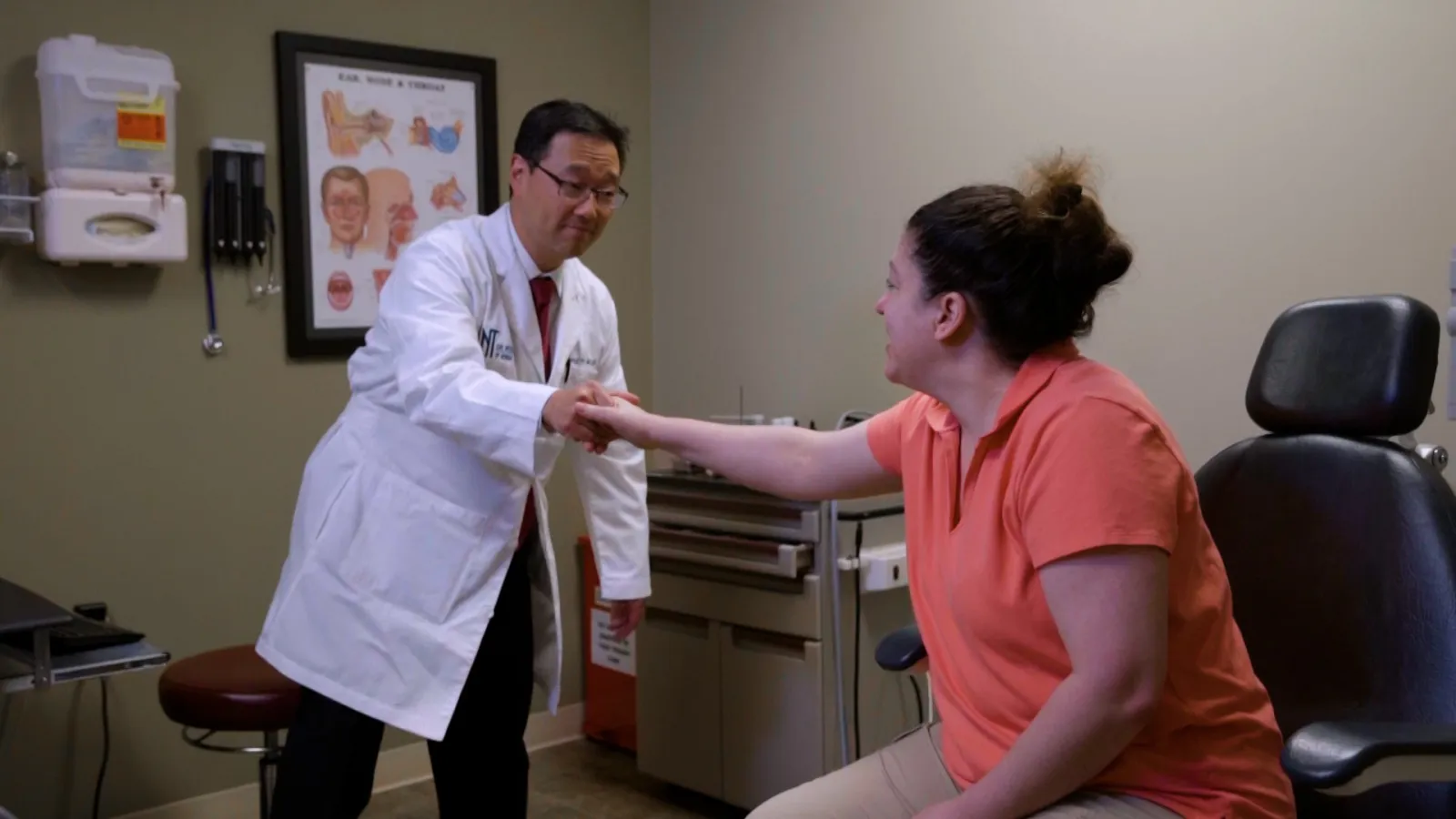Constant tonsil issues can seriously affect your quality of life. Since your tonsils are involved every time you eat or drink, constant tonsil irritation is hard to ignore.

The throat is lined with lymphatic tissue that helps protect your body from bacteria entering through the nose and mouth. This includes the adenoids, located high in the back of the nasal cavity, and the tonsils, found on either side at the back of the mouth. Other lymphatic tissues are lined throughout the throat and all three parts work together to defend your immune system against harmful bacteria.
Unfortunately, tonsils are especially prone to becoming enlarged or infected. If you've struggled with recurrent tonsils stones and other tonsil issues, it may be time to consider treatment for your tonsils with laser tonsil ablation, tonsil laser cryptolysis, or traditional tonsillectomies.
Our team at ENT of Georgia South can help determine if laser tonsil ablation or traditional tonsillectomy is right for you. You deserve to have a healthy, pain-free life. Call us today and schedule an appointment.
What are Tonsil Stones?
Tonsils naturally have grooves and crevices called crypts, which can trap bacteria, mucus, and food particles. People with enlarged tonsils often have deeper or more pronounced crypts, making them more prone to developing tonsil stones, which are small, hardened deposits that form when trapped debris becomes calcified over time.
Tonsil stones often appear as small white or yellow bumps on the surface of the tonsils, but they can also form deep within the tissue and remain hidden. Common signs include redness, irritation, bad breath, and a feeling of something being stuck in the throat. In some cases, they can lead to ongoing inflammation or even chronic tonsillitis.
What is Tonsillitis?
Tonsillitis is the inflammation of the tonsils, usually caused by a viral or bacterial infection. A sore throat is often the first sign, and the tonsils may appear red, swollen, or irritated as the illness progresses.
There are two types of tonsillitis: viral tonsillitis and bacterial tonsillitis.
Viral tonsillitis is caused by viruses like those responsible for the common cold or flu. It accounts for about 70% of cases and usually results in milder symptoms.
Bacterial tonsillitis, also known as strep throat, is caused by bacteria such as Group A Streptococcus. This form tends to cause more severe symptoms and often needs antibiotics to alleviate symptoms.
People who experience frequent tonsillitis may be more prone to tonsil stones, as repeated swelling can lead to the formation of small pockets in the tonsils where debris collects and hardens.
When Do I Know If I Need Surgery for My Tonsils?
If you frequently deal with tonsil stones or recurrent tonsillitis, surgical removal or reduction of the tonsils through a laser treatment for tonsil stones, tonsil laser cryptolysis, a tonsillectomy, or laser tonsil ablation is often recommended. Removal may also be advised for individuals with enlarged tonsils that interfere with eating, breathing, or cause sleep-related issues like sleep apnea.
Will my immune system weaken with the loss of my tonsils? When the tonsils are removed, other lymphatic tissues in the body take over their immune function. It's more important to treat chronically infected tonsils, since untreated infections can lead to complications affecting the ears, sinuses, lungs, kidneys, and even the heart.
What's the Difference Between a Tonsillectomy and a Laser Tonsil Ablation?
A tonsillectomy is the traditional surgical method for removing the tonsils, typically using a scalpel, heat, or a snare to take out the entire tonsil. This procedure requires general anesthesia and is often accompanied by a throat pain in recovery that can take up to three weeks to fully heal.
While tonsillectomies are still performed, they've become less common thanks to advancements in less invasive laser tonsil removal techniques like laser tonsil ablation, which offer faster recovery and less discomfort.
Laser tonsil ablation is a minimally invasive procedure that uses precise laser energy to shrink or remove only the problematic areas of enlarged or chronically infected tonsil tissue. It's often recommended for people dealing with chronic tonsillitis, enlarged tonsils, snoring, or sleep apnea, especially when other treatments haven't provided relief.
Unlike a full tonsillectomy, which removes the entire tonsil, this procedure preserves healthy tissue and focuses only on the affected areas. It's typically done under local anesthesia, involves minimal bleeding, and offers a faster, more comfortable recovery.
Other Tonsil Treatment Options
If your symptoms aren't severe enough to warrant a full tonsillectomy or laser tonsil ablation, tonsil laser cryptolysis may be a great alternative for you.
This procedure uses laser energy to smooth the natural crevices known as crypts in your tonsils, helping to reduce the buildup of bacteria that leads to tonsil stones and chronic infections. It's an effective, low-impact option that preserves your tonsil tissue while still offering a preventative measure for your tonsils.
Don't Let Your Tonsils Get The Best of You
If you or your loved one is struggling with frequent tonsillitis, it's time to ask for a second opinion. Call our team of dedicated ENT specialists at ENT of Georgia South and ask us how we can help alleviate your tonsil symptoms today.

